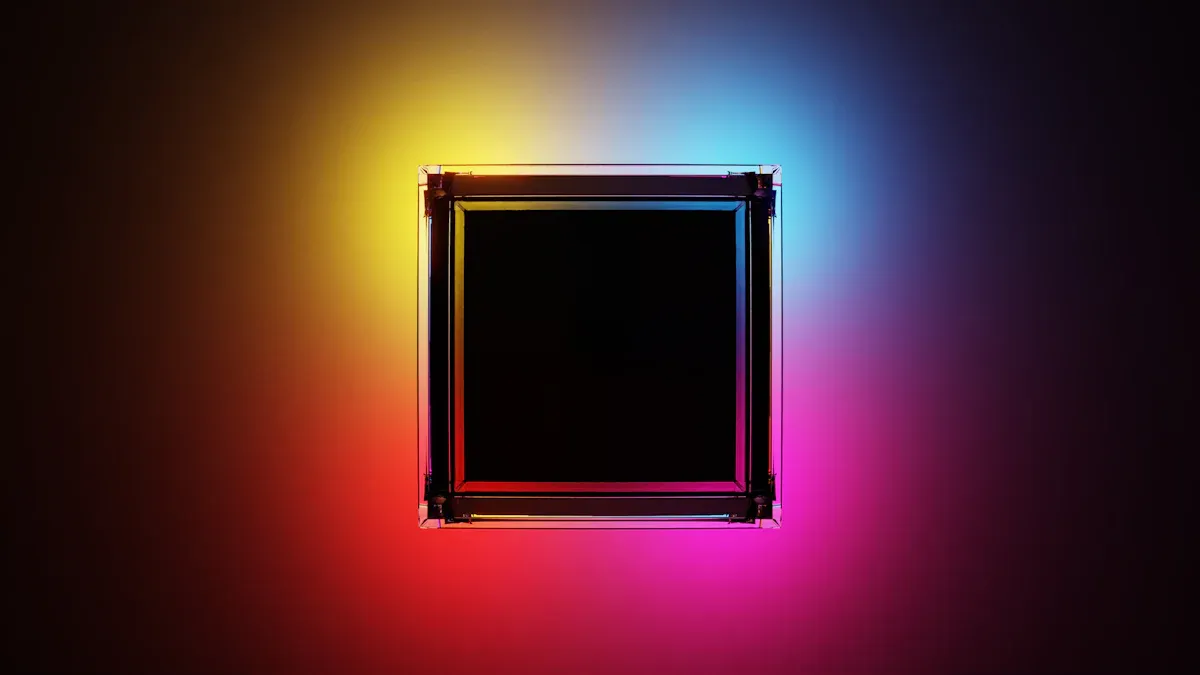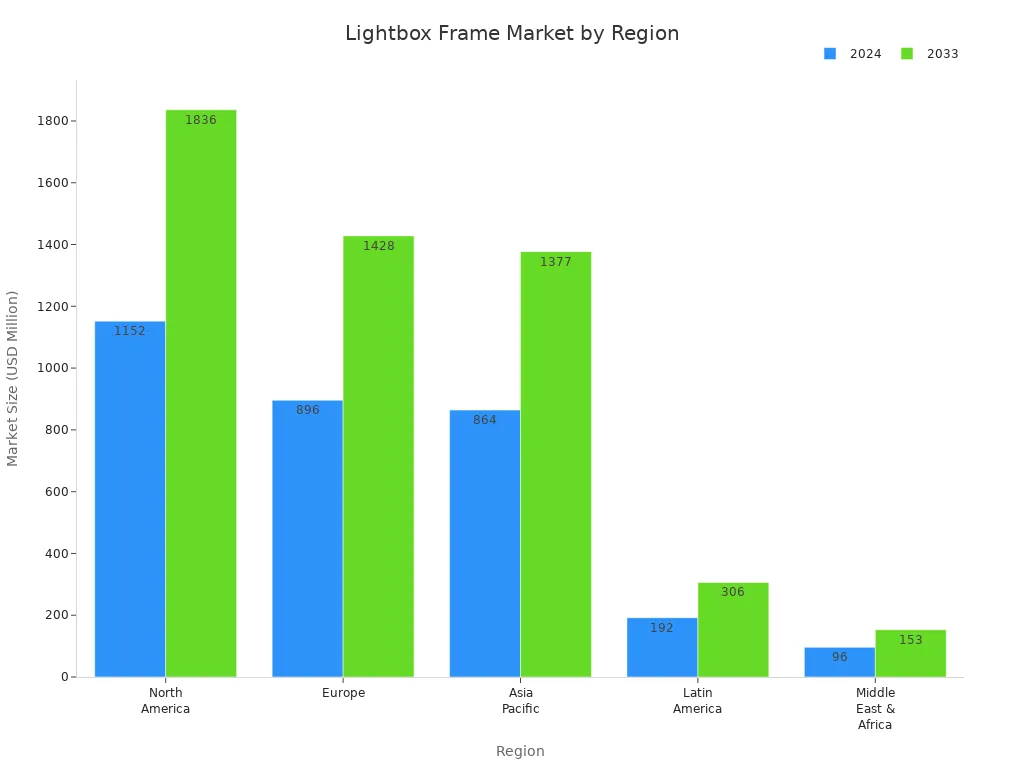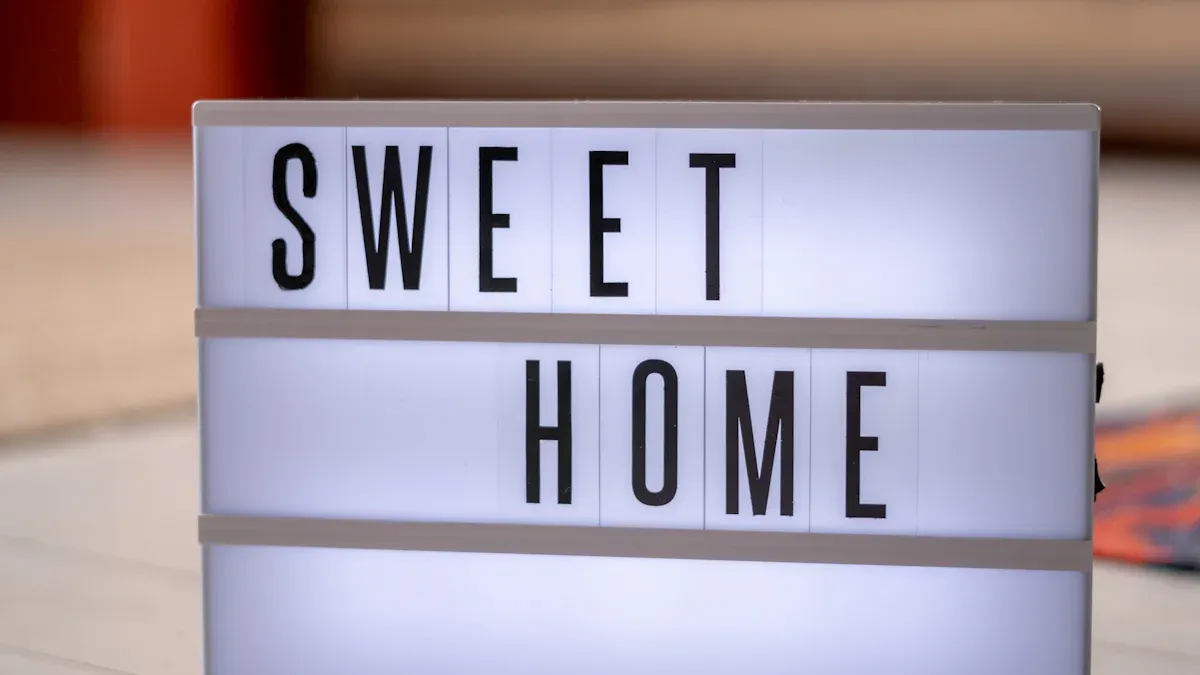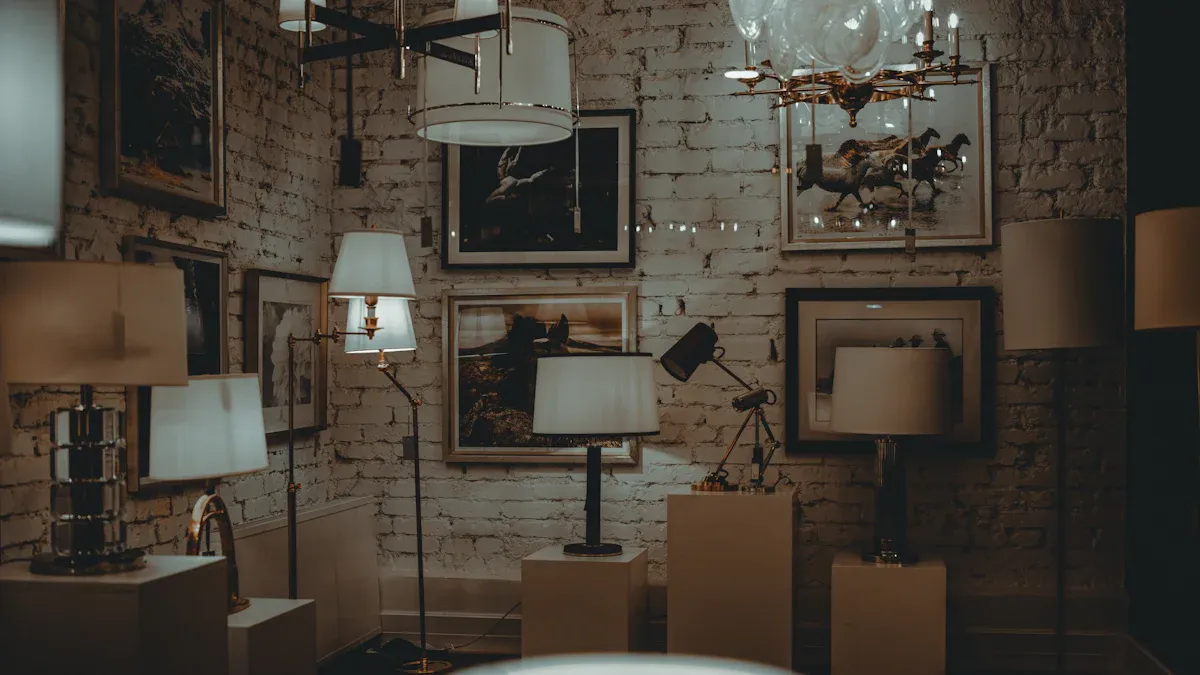Lightbox Frames: Types, Applications, and Selection Tips

You can see lightbox frames in many places. They are in stores and photo studios. A light box has lights inside. These lights help graphics, art, or products look bright. Many people use light boxes and lightbox frames. They use them for photos, ads, and home decoration. More people use them each year. In 2024, the world market for lightbox frames was $3.2 billion. It may grow to $5.1 billion by 2033.

There are different kinds of light boxes. Some are fabric, snap, or modular frames. Each type fits different needs. Think about what you want to show or photograph. This will help you pick the right light box display.
Key Takeaways
Lightbox frames use LED lights to make things look bright. They help images and products look clear. These lights save energy and last a long time.
There are many types of lightbox frames. Some are backlit, edge-lit, fabric SEG, snap frame, portable, and outdoor. Each type works best in certain places.
Lightbox displays work well in many places. You can use them in stores, trade shows, and transportation hubs. They are also good for restaurants, offices, homes, and outdoor ads. They help get people’s attention and make things easy to see.
Picking the right lightbox depends on where you use it. Think about the lighting style and graphic material. You should also think about how often you change graphics. Size, shape, and budget are important too.
To avoid mistakes, check the lighting quality first. Plan the installation with care. Make sure the frame type fits your display needs. This will help you get the best results.
Lightbox Frames Overview
What Are Lightbox Frames
You see lightbox frames in many places where people want to make displays stand out. A light box uses special lighting to brighten up graphics, photos, or products. Most lightbox frames use strong aluminum for the frame. This metal keeps the light box sturdy and protects the inside parts. The frame holds glass or acrylic panels. These panels let light shine through and make your images look clear and bright.
Many light boxes use LED lighting. LEDs last a long time and do not get hot. You can find lightbox frames in stores, airports, and even at home. Some light boxes use fabric stretched over the frame. This fabric is tough and keeps the image looking sharp. Outdoor lightbox frames use weather-resistant materials and sometimes have locks for safety. You can set up a light box quickly and change the display when you want.
Tip: If you want to use a light box for photography, choose one with high-quality lighting and a sturdy frame. This helps you get the best results for your photos.
Key Benefits
Lightbox frames give you many advantages over regular display frames. Here are some reasons why you might choose a light box for your displays or photography:
Lightbox frames use LED lighting, which saves energy and lasts longer than old-style bulbs.
You get bright, even lighting that makes your graphics and photos look better.
LED light boxes do not flicker or buzz, so your displays stay quiet and clear.
You can find many styles and sizes, so you can match your light box to your needs.
Light boxes need less maintenance and help you save money over time.
The materials in lightbox frames, like aluminum and LEDs, are good for the environment and easy to recycle.
A light box helps you show off your work with high quality and strong lighting. You can use light boxes for photography, advertising, or home displays. They make your images pop and keep your displays looking fresh.
Types of Lightbox Frames

Lightbox frames come in many types. Each type works best for certain uses. You can choose from different types of light boxes to fit your needs. Here is a closer look at the main types you will find:
Backlit Lightbox Frames
Backlit light boxes use LED lighting placed behind the graphic. This lighting shines through the image, making colors look bright and even. You often see backlit light boxes in malls, airports, and movie theaters. These frames work well for large displays because the lighting covers the whole area. You get strong, even light that helps your message stand out.
Tip: Use a back-lit light box when you want your display to grab attention from far away.
Backlit light boxes need a little more space behind the graphic for the lights. You can use them for posters, menus, or big signs. They work well for both indoor and outdoor displays. Many businesses pick backlit light boxes for their bold look and high impact.
Edge-Lit Lightbox Frames
Edge-lit light boxes use LED strips along the edges of the frame. The lighting spreads across the panel, lighting up the graphic from the sides. This type of light box is thinner and lighter than backlit light boxes. You can mount edge-lit light boxes on walls or hang them from ceilings.
Edge-lit light boxes save space and use less power. You get a slim design that looks modern and neat. These frames work best for smaller graphics or places where you want a low-profile display. Edgelit light boxes are popular in offices, retail stores, and hallways.
Note: Edge-lit light boxes may not be as bright as backlit light boxes, but they give a soft, even glow.
Fabric SEG Lightbox Frames
Fabric SEG lightbox frames use silicone edge graphics (SEG) technology. You stretch a high-resolution fabric graphic into an aluminum frame. The silicone edge fits into a groove, making the image look smooth and seamless. This type of light box gives you vivid and vibrant images.
You can install fabric SEG lightbox frames easily because they are lightweight.
The fabric graphics are simple to swap out, so you can update your display for new products or events.
You can pick from single-sided or double-sided frames, and choose half-lit or full-lit LED lighting.
These light boxes are cost-effective and last a long time, making them a smart choice for stores and trade shows.
You can mount them on walls or use them as free-standing displays.
The size of the frame affects how bright your display looks, so you can pick the right size for your space.
Fabric SEG lightbox frames help you keep your brand visible and fresh. You can change graphics quickly, which is great for busy commercial settings.
Snap Frame Lightbox Frames
Snap frame lightbox frames have a special snap-open design. You can open the frame from the front, making it easy to change graphics. This type of light box uses sturdy aluminum and has a thin, neat look.
The snap-open frame lets you swap posters fast, which is helpful if you change displays often.
The frame protects your graphics with a clear acrylic or polycarbonate sheet.
Snap frame light boxes look professional and fit well in offices, restaurants, and public spaces.
You need to handle the frame with care when changing posters. Backlit versions of snap frame light boxes need extra space behind the graphic for the lighting. They may cost more at first, but they last a long time.
Portable and Modular Frames
Portable light box frames give you flexibility for events and trade shows. You can set them up quickly without tools. Many come with rolling cases, so you can move them easily.
Modular frames let you connect several units to make bigger displays or different shapes.
Integrated LED lighting gives your booth a bright, even look.
You can add shelves or other display parts to modular light boxes.
The snap-and-lock design makes setup and teardown fast and simple.
You can reuse these light boxes for many events, saving time and money.
You can change the graphics on portable and modular light boxes with silicone-edged fabric. This makes it easy to update your branding for each event.
Outdoor Lightbox Frames
Outdoor lightbox frames are built to handle weather and rough use. They use strong aluminum frames with mitered corners for extra strength. A rubber gasket lining keeps out water and dust. The power supply is waterproof, so the light box stays safe outside.
A non-glare overlay protects your display from sun and rain. Many outdoor light boxes have locks to stop theft or tampering. These features help your light box last longer and keep your graphics looking good. You can use outdoor light boxes for bus stops, building signs, or outdoor ads.
Note: Outdoor lightbox frames protect your display from weather and damage, making them a smart choice for outside use.
You can pick from many types of lightbox frames. Each type has special features for different needs. Think about where you will use your light box, how often you will change graphics, and how bright you want your display to be.
Light Box Displays in Action

Retail and Shopping Malls
You can find light box displays in many stores and malls. These displays help get shoppers’ attention and share important messages. Light box frames make products look better by showing their colors and details. They also make the store brighter and more welcoming. You can put advertising light box frames at doors, near products, or at checkout to help sell more items.
Application Area / Strategy | Purpose in Retail and Shopping Malls | Typical Lightbox Content |
|---|---|---|
Standout Messaging | Get noticed in busy places | Bright backlit messages with strong colors |
Increased Product Absorption | Make products look more interesting | Clear photos on backlit film |
Improved Space Illumination | Make the store brighter | Big bright lightboxes as lights |
Emotional Connection | Help shoppers feel connected | Lifelike backlit photos with bright colors |
Trade Shows and Exhibitions
At trade shows, you want your booth to be noticed. Light box displays with SEG fabric and LED lights make your graphics stand out. You can set up these displays fast and move them easily. Many people use advertising light box frames to make booths in different shapes and sizes. These displays help bring more visitors and make your brand easy to remember. When you use a light box ad, your booth becomes special and hard to forget.
Tip: Use modular light box displays to add shelves or connect walls for a bigger display.
Transportation Hubs
Light box displays are important in airports, train stations, and bus stops. You can use them for signs, ads, and information. These displays stay bright all day and night because of LED lights inside. They help travelers find their way, see times, and notice deals. Advertising light box frames in busy places also help people remember brands.
Light box displays are easy to see even when it’s dark.
You can add your logo and brand colors to them.
They work for ads inside and outside.
Strong materials help them last in busy places.
Restaurants and Hospitality
Restaurants use light box displays to show menus clearly and set the mood. Thin LED light boxes make food photos look tasty and easy to see. You can match the design to your brand and use bright pictures to get attention. Some advertising light box displays have touch screens or QR codes for easy ordering.
Offices and Homes
You can use light box displays in offices and homes for branding or decoration. Backlit fabric SEG frames give a modern style and make logos or art pop. These displays are light and simple to put up. You can change the graphics fast, so your space always looks new. Light box displays add a strong visual effect that makes people feel good and helps your brand.
Outdoor Advertising
Outdoor advertising light box frames help your message stand out in busy places. People see lots of ads every day, but only remember a few. Bright light box displays grab attention and help people remember your ad. You can use big advertising light box frames for bus stops, building signs, or billboards. These displays work in any weather and keep your message clear at night.
Note: Outdoor advertising light box displays make your ads easier to remember and more powerful by using bright, eye-catching light.
Photo Light Box Uses
Product Photography
You want your product photos to look clear and nice. A photo light box helps you do this. It gives you good lighting that you can control. This stops harsh shadows and shows every part of your product. You can pick different lights, like LED or ones that change color, to fit your product.
A photo light box gives steady light and a simple background. This makes your product stand out.
You can show every part and take pictures from the best side.
Many photo light boxes are easy to carry and set up. You can fold them and take them anywhere for fast photos.
Good materials help your light box last longer, even if you use it a lot.
Using the best photo boxes helps people trust your business. Great product photos help your store get noticed online. You can follow easy steps: put your product in the middle, find the best side, move closer or farther, and take many pictures. This way, you get great photos without spending a lot. Many online sellers use photo light boxes to make better pictures and grow their business.
Tip: Buying a good photo box helps you make a strong first impression and sell more.
Art and Display
You can use a photo light box for more than just products. Many art shows and galleries use lightbox frames to show art. These frames use LED lights to make colors bright and details easy to see. You can move these frames because they are light and small.
LED lightboxes use little power and stay cool, so they are safe and good for the planet.
The frame is hidden, so people look at the art, not the frame.
You can set up these displays fast and change the art when you want.
Lightbox frames help you make a warm and fun space. They make special art pieces stand out and help tell your story. Visitors enjoy a cool and interesting experience. When you use photo light boxes for art, your display is more fun and easy to remember.
Note: Lightbox displays are good for short shows and for art that stays up all the time.
Choose the Right Light Box
When you pick a light box, you should think about a few things. These choices change how your display looks, how long it lasts, and what it costs. This guide will help you make a smart choice.
Location: Indoor vs. Outdoor
First, think about where you will use your light box. Indoor and outdoor places need different things. Indoor frames can be lighter and do not need to block rain or sun. Outdoor frames must be strong and keep out water and dust. Look for aluminum frames with seals and locks for outside. These parts keep your graphics safe from weather and damage. Outdoor frames are often thicker and have special coatings to last longer.
Tip: If you want to use your display outside, pick a frame that is weatherproof and has locks. This keeps your display safe and strong.
Lighting: Backlit or Edge-Lit
The lighting you pick changes how your display looks and how much power it uses. Backlit light boxes have LEDs behind the graphic. This gives bright and even light everywhere. Edge-lit light boxes have LEDs only on the sides. This makes the frame thinner and uses less power, but the light may not be as even.
Aspect | LED Array (Backlit) | LED Edge-Lit |
|---|---|---|
Grid-like pattern behind the screen | LEDs placed only along the edges | |
Brightness Uniformity | More even and consistent brightness | Less uniform brightness |
Energy Consumption | Higher energy use due to more LEDs | Lower energy use due to fewer LEDs |
Cost | Generally more expensive | Generally less expensive |
If you want a big, bright display, backlit lighting is best. For smaller or thinner displays, edge-lit lighting saves space and power.
Graphic Material: Fabric or Film
The graphic material changes how your display looks, feels, and lasts. You can pick fabric or film graphics. Each one has good points.
Feature/Aspect | Fabric Graphics | Film Graphics (Duratrans, Vinyl) |
|---|---|---|
Surface Appearance | Zero-glare surface with bright, saturated colors | Very bright, saturated colors, especially in sandwich lightboxes |
Weight | Lighter due to no heavy lenses | Heavier because lenses are required |
Transport & Handling | Easier and more secure; can be folded or rolled | More fragile and heavier, less convenient |
Cost | More cost-effective, especially for large sizes | Generally more expensive, especially for large seamless sizes |
Graphic Size Limitations | Seamless widths up to 10 ft, lengths up to ~40 ft | Duratrans up to ~6x10 ft; vinyl can be much larger with heat-seaming |
Outdoor Suitability | Less suitable due to absorbency and vandalism | Vinyl film offers outdoor durability; Duratrans less so |
Installation | Held flat by stretch tension, no lenses needed | Requires lenses (polycarbonate) for sandwich lightboxes |
Durability | Lower vandal resistance | More durable, especially vinyl for outdoor use |
Application Preference | Indoor, large-format, lightweight, cost-effective | Smaller sizes, outdoor durability, max color saturation |
Fabric graphics are good for big, light indoor displays. Film graphics, like vinyl, are better for outside and for small, tough displays. Always match the graphic to your place and needs for the best look.
Loading Method: Snap, SEG, or Other
Think about how you will put in and change your graphics. Snap frames let you open the front and change posters fast. This is good if you change graphics a lot. SEG frames use fabric with a silicone edge that fits in a groove. This gives a smooth look and makes changing easy. Other ways, like slide-in or magnetic frames, also help you update your display.
Note: If you want to change graphics often, pick a snap frame or SEG frame. They are fast and easy to use.
Size and Shape
The size and shape of your light box change how people see your display. You can pick standard or custom sizes and shapes for your space. The right size helps your display stand out but not take over. A good shape matches your brand and makes your message clear.
Standard and custom sizes fit different spaces and brands.
Size and shape help make sure your display is lit well.
The right size helps people see your display but does not make it too big.
Shape and size can match your brand style for a strong look.
Light frames with handles or wheels are easy to move.
Some places have rules for size or shape.
Cost depends on size and design, so think about your budget.
Slim LED lightboxes look modern in cafes. Floor-standing frames work well at busy doors.
Budget and Durability
Your budget and how long you want your light box to last will help you choose. There are many frame choices, from simple aluminum to fancy wood or metal. Some systems let you pick finishes, locks, and other features. For outside, pick aluminum frames with weatherproof coatings, locks, and security screws. These keep your display safe and looking good, even in bad weather.
You can save money and get a strong frame by picking the right materials and features. Outdoor frames with extra protection cost more at first, but last longer and keep your graphics safe. Indoor frames can use lighter materials to save money and still look nice.
Tip: Always match the frame and features to your use. This helps you get the best quality and value for your display.
Common Mistakes
When you pick a lightbox frame, you want your project to look great. But some people make mistakes that hurt how it turns out. If you know about these mistakes, you can stop them and get better results.
Overlooking Lighting Quality
Lighting is a big part of any lightbox frame. If you do not care about lighting, your display will not look good. You might see bright spots, flickers, or faded pictures. These problems make your display look messy.
Here are some lighting mistakes and what they do:
Common Mistake | Cause(s) | Explanation / Impact |
|---|---|---|
Uneven Lighting or Hotspots | Bad LED setup, weak diffusion, poor LEDs | Makes bright spots that distract people. |
Flickering or Pulsing Lights | Weak power, wrong LED parts, signal problems | Makes your display shaky and does not last long. |
Premature LED Failure | Too much heat, bad wires, cheap LEDs | Makes you fix your display more often. |
Discoloration or Fading of Graphics | Sunlight, cheap prints, bad air | Makes your photos or signs lose color. |
Poor Maintenance | No cleaning or checking | Makes your display work worse and not last as long. |
Tip: Always check your lights before you finish. Good lighting makes your photos and signs look their best.
Ignoring Installation Needs
You need to plan how you will set up your lightbox. Some people forget about space, tools, or how to hang the frame. If you skip these things, your setup can be hard or unsafe. Some frames need special parts or supports. Some need power close by. If you do not follow the steps, your display may not work right.
Make sure you have enough space for your setup.
Check if you need extra tools or help.
Read the instructions before you start.
Test the lights after you set up to see if they work.
Plan for easy changes if you need to swap pictures or fix things.
Note: A good setup saves time and helps your display look good from the start.
Mismatching Frame and Use
Picking the wrong frame can cause lots of problems. You might get a frame that does not fit or last where you use it. For example, fabric lightboxes do not work well outside. The fabric can get wet and is not safe from damage. If you use a sandwich lightbox for a huge sign, you may have size problems. Frames longer than 18 feet need seams, which can look bad.
Here are some problems if you pick the wrong frame:
Fabric lightboxes outside can break from water and weak safety.
Sandwich lightboxes cannot be used for very big signs.
Seams in big frames can make your photos or signs look worse.
The wrong frame can make setup harder and cost more.
You may have to fix your display more if you pick the wrong frame.
Always pick the right frame for your project. This helps your display last longer and look better.
When you choose a lightbox frame, focus on these top tips:
Pick a deeper cabinet for even light across your display.
Match the lighting type to your needs. Backlit frames give more brightness. Edge-lit frames save energy and space.
Select a frame built for your location, especially for outdoor use.
A display expert can help you find the best size, style, and features for your project. You get advice that fits your budget and goals. Explore your options and make your next display stand out.
FAQ
What is the best way to clean a lightbox frame?
Use a soft, dry cloth to wipe the frame. For tough spots, use a damp cloth with mild soap. Avoid harsh cleaners. Always unplug the lightbox before cleaning.
Can you use any graphic with a lightbox frame?
You need graphics made for lightboxes. Use backlit film or fabric for the best results. Regular paper does not let enough light through and may look dull.
How long do LED lights in lightbox frames last?
LED lights in most lightbox frames last 30,000 to 50,000 hours. You can use your lightbox for years without changing the lights.
Are lightbox frames safe for outdoor use?
Only use outdoor-rated lightbox frames outside. These frames have weatherproof seals and strong materials. Indoor frames may get damaged by rain or sun.
Can you change the graphics yourself?
Yes, you can change graphics in most lightbox frames. Snap frames and SEG frames make this easy. You do not need special tools for most models.
See Also
Exploring Acrylic Poster Frames: Varieties, Advantages, And Setup
Guide To Acrylic Light Boxes: Uses, Benefits, And Choosing Advice
Comparing Frameless And Framed Acrylic LED Light Boxes For Spaces
Creative Uses And Benefits Of Various Acrylic Photo Light Boxes
Using Acrylic Frames To Showcase Documents And Office Presentations

